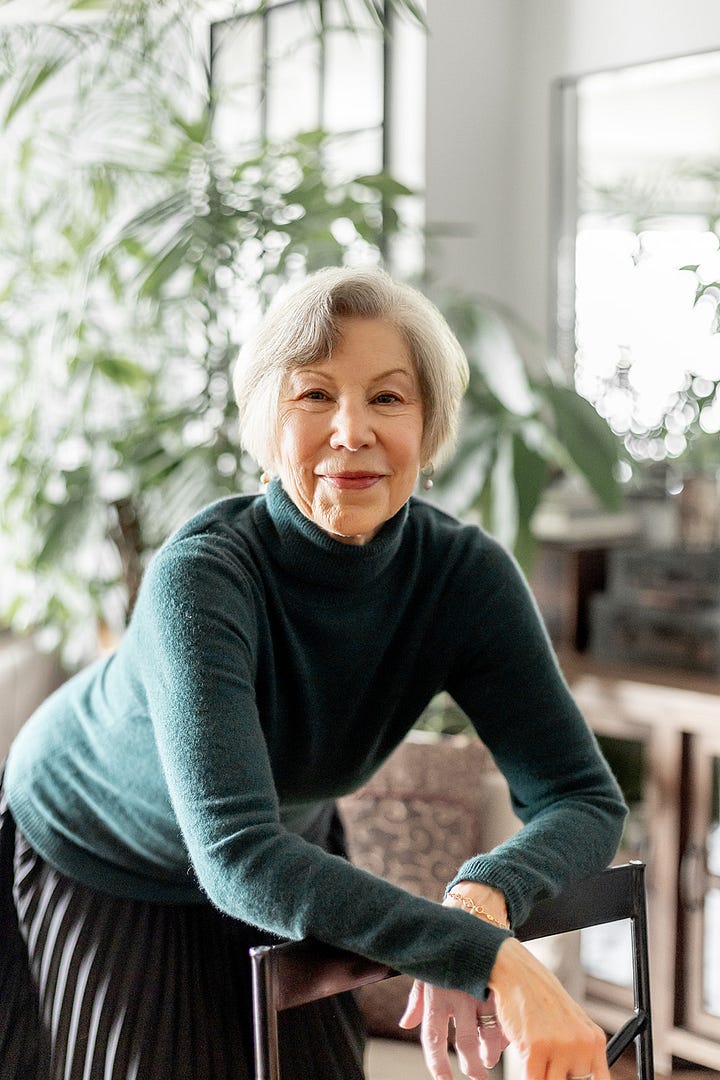Author interviews almost always focus on questions regarding an author’s latest publication (and that’s great because it’s how readers discover new books!) but sometimes it’s fun to ask authors to talk about their lives beyond the book they’ve just written. Authors Answer (started as a blog in 2020, moved onto Substack in 2025), is an attempt to give authors space to wax eloquent about the other influences on their writing. The questions posed here move beyond the formulaic classics like, “What books are on your nightstand?” or “What book inspired you to be a writer?” and even “You’re having a dinner party….which three authors (dead or alive) do you invite?” There are 20 standing questions. Authors pick FIVE that they want to answer.
Are you an author? Visit the Questions page to learn more about participating.
Today’s post features
.Martha Jean Johnson is a writer of fiction and non-fiction and the author of a series of books and articles on public opinion and public policy. The Queen’s Musician is her debut novel. She also reviews trends in historical fiction and discusses her own love of reading and writing in her biweekly blog, Historical Magic. She currently divides her time between writing and her work with the National Issues Forums Institute, an organization that encourages civil discourse and nonpartisan deliberation on national and local issues.
During a long public policy career, she analyzed and reported on American public thinking, working with noted social analyst and public opinion pioneer, Daniel Yankelovich. She has published articles in USA Today and The Huffington Postand appeared on CNN, MSNBC, and PBS. She is the author of a series of nonfiction paperbacks on major political issues, co-authored with Scott Bittle and published by HarperCollins. She holds degrees from Mount Holyoke College, Brown University, and Simmons College. She lives in Jersey City, New Jersey


You can find her on Substack
.Are there particular films that have influenced your writing?
I’m a long-time Masterpiece Theater superfan, so I’ve watched a slew of programs about the Tudors. I devoured Elizabeth R (with the brilliant Glenda Jackson) and The Six Lives of Henry VIII. More recently, I’ve been mesmerized by Wolf Hall, and I credit these productions with hooking me on the spectacle and intrigue of this era. Even though men have dominated much of history, the Tudor dynasty included powerful women who left indelible marks on their time: Katherine of Aragon, Anne Boleyn, Catherine Parr, and Elizabeth I, whose name encapsulates an epoch. All were all astute, well-educated, and confident. I think it’s fair to say they all shifted the course of history.
My novel’s protagonist, Mark Smeaton, is a minor character in Wolf Hall and in TV series and movies such as The Tudors and Anne of a Thousand Days. These plots revolve around the king, the queens, the courtiers, the powerful ministers, the elites with titles and estates. Mark is more like the rest of us, and yet he plays a pivotal role in Anne Boleyn’s tragedy. I wanted to let him speak for himself.
Is there a genre of music that influences your writing/thinking? Do you listen to music while you write?
I don’t listen to music while I write, but for this novel, music was definitely on my mind. Since the book tells a musician’s story, I listened to Renaissance music as part of my research—the religious music in particular is sublime. I read about the role of court musicians and talked to musician friends. So while I didn’t have a playlist going while I was typing, I often heard music inside my head.
Is there a work of art that you love. Why? Have you ever visited it in person?
A few year ago, I was visiting the Frick Collection in New York, and I noticed their Rembrandt “Self-Portrait” from across the room. Even at a distance, this painting’s surface glistens and shimmers with gold and ivory tones. I walked over to stand in front of it. Rembrandt was in his early fifties when he painted it, but he presents himself as a man chastened by life. The face is weathered and discolored. The eyes are intelligent but vulnerable. The Frick suggests that the artist “decided to pack his entire life into this image of himself, both what had gone before, and what lay ahead.” To me, this painting is both glorious and all-too-human. I fell in love with it at first sight.
If you could create a museum exhibition, what would be the theme?
Musicians and their instruments—I’d assemble paintings, prints, and photos from across the ages. I often transfixed by musicians playing, and quite a few artists seem to be as well. I might give a little extra attention to the Renaissance and musicians playing lutes and mandolins. The stringed instruments in these paintings are often beautifully rounded and voluptuous. For pianos, I might lean toward black-and-white photography. I’m always drawn to photos that highlight the elegance of a grand piano and the passion of someone who plays it well.
What brings you great joy?
Music—and dance. Flowers, cats, rose-gold sunrises and sunsets. Every year, I celebrate the changing of the seasons, nature’s astonishing metamorphosis. I adore snowfalls where the ice clings to the tree branches and creates these lacey cathedral-like passageways. Walking underneath is like being admitted to fantasyland.
Endnotes!
This newsletter is a passion project started by me, Elizabeth Rynecki, to try to help shine a light on new-to-me authors. I am also an author (and a documentary filmmaker and podcaster) and if you want to learn more about me, you can visit my website or read my personal newsletter, Ink Trails: A Chronicle in Creativity.
I’ve never made Authors Answer specific social media accounts, but you can find me on Instagram, Threads, and BlueSky.


